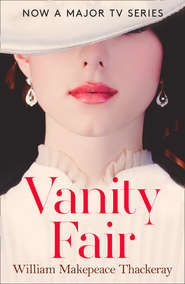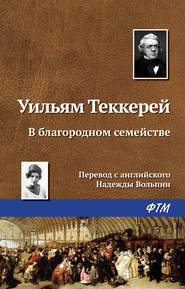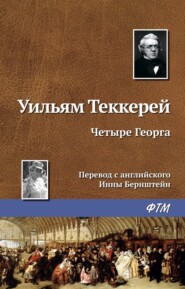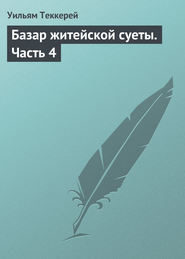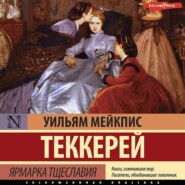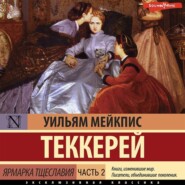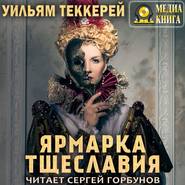По всем вопросам обращайтесь на: info@litportal.ru
(©) 2003-2024.
✖
Ярмарка тщеславия / Vanity Fair
Автор
Год написания книги
2017
Теги
Настройки чтения
Размер шрифта
Высота строк
Поля
Sambo made his appearance with a tray, containing sandwiches on which Joseph Sedley’s attention was immediately fixed. When the parents of the house of Sedley returned from their party, they found the young people so busy in talking, that they had not heard the arrival of the carriage.
“Bravo, Jos!” said Mr. Sedley; Jos instantly relapsed into an alarmed silence,[7 - мгновенно погрузился в тревожное молчание] and quickly took his departure. He did not lie awake all night thinking whether or not he was in love with Miss Sharp; but he thought to himself how delightful it would be to hear such songs as those and what a sensation she would make at the Calcutta balls. “It’s evident the poor devil’s in love with me,” thought he. “She is just as rich as most of the girls who come out to India!” And in these meditations he fell asleep.
How Miss Sharp lay awake, thinking, will he come or not tomorrow? need not be told here. To-morrow came, and, as sure as fate, Mr. Joseph Sedley made his appearance before luncheon.
How her heart beat as Joseph appeared. It was a nervous moment for all. Sambo announced Mr. Joseph, who followed grinning bearing two handsome bunches of flowers, the young women were delighted with the gift, as Joseph presented one to each, with a bow.
“Bravo, Jos!” cried Osborne.
“Thank you, dear Joseph,” said Amelia, quite ready to kiss her brother.
“O heavenly, heavenly flowers!” exclaimed Miss Sharp, and smelt them delicately, and held them to her bosom, and cast up her eyes to the ceiling. Perhaps she just looked first into the bouquet, but there was no letter.
So the conversation went on. I don’t know on what pretext Osborne left the room, or why, presently, Amelia went away, but Jos was left alone with Rebecca, who had resumed her work.
“What a beautiful song that was you sang last night, dear Miss Sharp,” said the Collector. “It made me cry almost.”
“Because you have a kind heart, Mr. Joseph; all the Sedleys have, I think.”
“It kept me awake last night, and I was trying to hum it this morning, in bed; Miss Sharp; my dear Miss Sharp, do sing it.”
“Not now, Mr. Sedley,” said Rebecca, with a sigh. “My spirits are not equal to it;[8 - Я не в настроении для пения.] besides, I must finish the purse. Will you help me, Mr. Sedley?” And before he had time to ask how, Mr. Joseph Sedley was actually seated tete-a-tete with a young lady, looking at her with a most killing expression; his arms stretched out before her, and his hands bound in a web of green silk. In this romantic position Osborne and Amelia found the interesting pair, when they entered. But Mr. Jos had never spoken.
“I am sure he will tonight, dear,” Amelia said, as she pressed Rebecca’s hand; and Sedley, too, said to himself, “’Gad, I’ll pop the question at Vauxhall.”
5
Cuff’s fight with Dobbin, and the unexpected issue of that contest, will long be remembered by every man who was educated at Dr. Swishtail’s famous school. The latter Youth was the quietest, the clumsiest, and, as it seemed, the dullest of all Dr. Swishtail’s young gentlemen. His parent was a grocer in the city: and he was admitted into Dr. Swishtail’s academy upon what are called “mutual principles” – that is to say, the expenses of his board and schooling were compensated by his father in goods, not money. A dreadful day it was for young Dobbin when one of the youngsters of the school, saw the cart of Dobbin & Rudge at the Doctor’s door, discharging a cargo.
Young Dobbin had no peace after that. The jokes were frightful, and merciless against him.
“Your father’s only a merchant, Osborne,” Dobbin said in private to the little boy who had brought down the storm upon him. At which the latter replied, “My father’s a gentleman, and keeps his carriage”; and Mr. William Dobbin retreated to a remote outhouse in the playground, where he passed a half-holiday in the bitterest sadness.
High and low, all made fun of him. And he bore everything quite patiently, and was entirely dumb and miserable.
Cuff, on the contrary, was the great chief and dandy of the Swishtail Seminary. He smuggled wine in. He fought the townboys. Ponies used to come for him to ride home on Saturdays. He could knock you off forty Latin verses in an hour. He could make French poetry. What else didn’t he know, or couldn’t he do? They said even the Doctor himself was afraid of him. Cuff, the unquestioned king of the school, ruled over his subjects, and bullied them, with splendid superiority. This one blacked his shoes: that toasted his bread, others would give him balls at cricket during summer afternoons.
“Figs” was the fellow whom he despised most. One day in private, the two young gentlemen had had a difference. Figs, alone in the schoolroom, was sitting over a home letter; when Cuff, entering, bade him go upon some message. “I can’t,” says Dobbin; “I want to finish my letter.”
“You CAN’T?” says Mr. Cuff, laying hold of that document (the poor fellow was writing to his mother, who was fond of him, although she was a grocer’s wife) “You CAN’T?” says Mr. Cuff: “I should like to know why, pray? Can’t you write to old Mother Figs tomorrow?”
“Don’t call names,” Dobbin said, getting off the bench very nervous.
“Well, sir, will you go?” crowed the cock of the school.
“Put down the letter,” Dobbin replied.
“Well, NOW will you go?” says the other.
“No, I won’t. Don’t strike, or I’ll THMASH you,” roared out Dobbin, looking so wicked, that Mr. Cuff paused, turned down his coat sleeves again, put his hands into his pockets, and walked away with a sneer. But he never meddled personally with the grocer’s boy after that.
Some time after this interview, it happened that Mr. Cuff, on a sunshiny afternoon, was in the neighbourhood of poor William Dobbin, who was lying under a tree in the playground.
Well, William Dobbin had for once forgotten the world, and was away with Sindbad the Sailor in the Valley of Diamonds, when shrill cries, as of a little fellow weeping; and looking up, he saw Cuff before him, fighting a little boy.
It was the lad who had peached upon him about the grocer’s cart; but he bore little malice,[9 - не держал зла] not at least towards the young and small. There was everyday life before honest William; and a big boy beating a little one without cause. Up he sprang, and screamed out,
“Hold off, Cuff; don’t bully that child any more; or I’ll – ”
“Or you’ll what?” Cuff asked in amazement at this interruption. “Hold out your hand, you little beast.”
“I’ll give you the worst thrashing you ever had in your life,” Dobbin said, in reply to the first part of Cuff’s sentence; and little Osborne, gasping and in tears, looked up with wonder at seeing this amazing champion put up suddenly to defend him: while Cuff’s astonishment was scarcely less.
“After school,” says he, of course; after a pause and a look, as much as to say, “Make your will, and communicate your last wishes to your friends between this time and that.”
“As you please,” Dobbin said. “You must be my bottle holder, Osborne.”
“Well, if you like,” little Osborne replied.
When the hour of battle came, he was almost ashamed to say, “Go it, Figs”; and not a single other boy in the place cried that for the first two or three rounds of this famous combat.
Figs’s left hand made terrific play during all the rest of the combat. Cuff went down every time. At the sixth round, there were almost as many fellows shouting out, “Go it, Figs,” as there were youths exclaiming, “Go it, Cuff.” At the twelfth round the latter champion had lost all presence of mind and power of attack or defence. Figs, on the contrary, was calm. And now all the boys set up such a shout for Figs as would have made you think he had been their darling champion through the whole battle; and as absolutely brought Dr. Swishtail out of his study, curious to know the cause of the uproar.
Cuff, who had come to himself by this time, and was washing his wounds, stood up and said, “It’s my fault, sir – not Figs’ – not Dobbin’s. I was bullying a little boy; and he served me right.” By which speech he not only saved his conqueror a whipping, but got back all his ascendancy over the boys which his defeat had nearly cost him.[10 - Этой речью он не только спас своего победителя от порки, но и вернул все свое влияние на мальчиков, которое чуть было не потерялось после его поражения.]
In consequence of Dobbin’s victory, his character rose prodigiously in the estimation of all his schoolfellows, and the name of Figs became as respectable and popular a nickname as any other in use in the school. “After all, it’s not his fault that his father’s a grocer,” George Osborne said, who, though a little chap, had a very high popularity among the Swishtail youth; and his opinion was received with great applause. It was voted low to sneer at Dobbin about this accident of birth. “Old Figs” grew to be a name of kindness and endearment.
And Dobbin’s spirit rose with his altered circumstances. He made wonderful advances in scholastic learning. Dobbin was much too modest a young fellow to suppose that this happy change in all his circumstances arose from his own generous and manly disposition: he chose to attribute his good fortune to George Osborne, to whom he vowed such a love and affection as is only felt by children. He flung himself down at little Osborne’s feet, and loved him. He believed Osborne to be the possessor of every perfection, to be the handsomest, the bravest, the most active, the cleverest, the most generous of created boys. He shared his money with him.
So that Lieutenant Osborne, when coming to Russell Square on the day of the Vauxhall party, said to the ladies, “Mrs. Sedley, Ma’am, I hope you have room; I’ve asked Dobbin of ours to come and dine here, and go with us to Vauxhall. He’s almost as modest as Jos.”
That evening, when Amelia came into the drawing room as fresh as a rose – a very tall gentleman, with large hands and feet, and large ears, advanced to meet her, and made her one of the clumsiest bows. This was no other than Captain William Dobbin, of His Majesty’s Regiment of Foot, returned from yellow fever, in the West Indies.
When she held out her hand for him to shake, before he enveloped it in his own, he paused, and thought – ”Well, is it possible – are you the little maid such a short time ago? What a blooming young creature you seem!” All this he thought, before he took Amelia’s hand into his own.
Young Osborne followed presently in the same regiment. They had served in the West Indies and in Canada. Their regiment had just come home, and the attachment of Dobbin to George Osborne was as warm and generous now as it had been when the two were schoolboys. So these worthy people sat down to dinner presently. They talked about war and glory. Miss Sharp kindled with this exciting talk, but Miss Sedley trembled and grew quite faint as she heard it. Mr. Jos told several of his tiger-hunting stories, helped Rebecca to everything on the table, drank a great deal.
“He’s priming himself,” Osborne whispered to Dobbin, and at length the hour and the carriage arrived for Vauxhall.
6
The argument stands thus – Osborne, in love with Amelia, has asked an old friend to dinner and to Vauxhall – Jos Sedley is in love with Rebecca. Will he marry her? That is the great subject now in hand. Let us then step into the coach with the Russell Square party, and be off to the Gardens. There is barely room between Jos and Miss Sharp, who are on the front seat. Mr. Osborne sitting opposite, between Captain Dobbin and Amelia.
Every soul in the coach agreed that on that night Jos would propose to make Rebecca Sharp Mrs. Sedley. Amelia was quite enthusiastic for the match. Mr. Sedley was neutral. “Let Jos marry whom he likes,” he said; “it’s no affair of mine. This girl has no fortune; no more had Mrs. Sedley. She seems good-humoured and clever, and will keep him in order, perhaps.” So that everything seemed to smile upon Rebecca’s fortunes. All she wanted was the proposal.
The party was landed at the Royal Gardens in due time. As the majestic Jos stepped out of the creaking vehicle the crowd gave a cheer for the fat gentleman, who blushed and looked very big and mighty, as he walked away with Rebecca under his arm. George, of course, took charge of Amelia. She looked as happy as a rose-tree in sunshine.
Honest Dobbin contented himself by giving an arm to the shawls, and by paying at the door for the whole party. He walked very modestly behind them. About Rebecca and Jos he did not care a fig. But he thought Amelia worthy even of the brilliant George Osborne.
“Bravo, Jos!” said Mr. Sedley; Jos instantly relapsed into an alarmed silence,[7 - мгновенно погрузился в тревожное молчание] and quickly took his departure. He did not lie awake all night thinking whether or not he was in love with Miss Sharp; but he thought to himself how delightful it would be to hear such songs as those and what a sensation she would make at the Calcutta balls. “It’s evident the poor devil’s in love with me,” thought he. “She is just as rich as most of the girls who come out to India!” And in these meditations he fell asleep.
How Miss Sharp lay awake, thinking, will he come or not tomorrow? need not be told here. To-morrow came, and, as sure as fate, Mr. Joseph Sedley made his appearance before luncheon.
How her heart beat as Joseph appeared. It was a nervous moment for all. Sambo announced Mr. Joseph, who followed grinning bearing two handsome bunches of flowers, the young women were delighted with the gift, as Joseph presented one to each, with a bow.
“Bravo, Jos!” cried Osborne.
“Thank you, dear Joseph,” said Amelia, quite ready to kiss her brother.
“O heavenly, heavenly flowers!” exclaimed Miss Sharp, and smelt them delicately, and held them to her bosom, and cast up her eyes to the ceiling. Perhaps she just looked first into the bouquet, but there was no letter.
So the conversation went on. I don’t know on what pretext Osborne left the room, or why, presently, Amelia went away, but Jos was left alone with Rebecca, who had resumed her work.
“What a beautiful song that was you sang last night, dear Miss Sharp,” said the Collector. “It made me cry almost.”
“Because you have a kind heart, Mr. Joseph; all the Sedleys have, I think.”
“It kept me awake last night, and I was trying to hum it this morning, in bed; Miss Sharp; my dear Miss Sharp, do sing it.”
“Not now, Mr. Sedley,” said Rebecca, with a sigh. “My spirits are not equal to it;[8 - Я не в настроении для пения.] besides, I must finish the purse. Will you help me, Mr. Sedley?” And before he had time to ask how, Mr. Joseph Sedley was actually seated tete-a-tete with a young lady, looking at her with a most killing expression; his arms stretched out before her, and his hands bound in a web of green silk. In this romantic position Osborne and Amelia found the interesting pair, when they entered. But Mr. Jos had never spoken.
“I am sure he will tonight, dear,” Amelia said, as she pressed Rebecca’s hand; and Sedley, too, said to himself, “’Gad, I’ll pop the question at Vauxhall.”
5
Cuff’s fight with Dobbin, and the unexpected issue of that contest, will long be remembered by every man who was educated at Dr. Swishtail’s famous school. The latter Youth was the quietest, the clumsiest, and, as it seemed, the dullest of all Dr. Swishtail’s young gentlemen. His parent was a grocer in the city: and he was admitted into Dr. Swishtail’s academy upon what are called “mutual principles” – that is to say, the expenses of his board and schooling were compensated by his father in goods, not money. A dreadful day it was for young Dobbin when one of the youngsters of the school, saw the cart of Dobbin & Rudge at the Doctor’s door, discharging a cargo.
Young Dobbin had no peace after that. The jokes were frightful, and merciless against him.
“Your father’s only a merchant, Osborne,” Dobbin said in private to the little boy who had brought down the storm upon him. At which the latter replied, “My father’s a gentleman, and keeps his carriage”; and Mr. William Dobbin retreated to a remote outhouse in the playground, where he passed a half-holiday in the bitterest sadness.
High and low, all made fun of him. And he bore everything quite patiently, and was entirely dumb and miserable.
Cuff, on the contrary, was the great chief and dandy of the Swishtail Seminary. He smuggled wine in. He fought the townboys. Ponies used to come for him to ride home on Saturdays. He could knock you off forty Latin verses in an hour. He could make French poetry. What else didn’t he know, or couldn’t he do? They said even the Doctor himself was afraid of him. Cuff, the unquestioned king of the school, ruled over his subjects, and bullied them, with splendid superiority. This one blacked his shoes: that toasted his bread, others would give him balls at cricket during summer afternoons.
“Figs” was the fellow whom he despised most. One day in private, the two young gentlemen had had a difference. Figs, alone in the schoolroom, was sitting over a home letter; when Cuff, entering, bade him go upon some message. “I can’t,” says Dobbin; “I want to finish my letter.”
“You CAN’T?” says Mr. Cuff, laying hold of that document (the poor fellow was writing to his mother, who was fond of him, although she was a grocer’s wife) “You CAN’T?” says Mr. Cuff: “I should like to know why, pray? Can’t you write to old Mother Figs tomorrow?”
“Don’t call names,” Dobbin said, getting off the bench very nervous.
“Well, sir, will you go?” crowed the cock of the school.
“Put down the letter,” Dobbin replied.
“Well, NOW will you go?” says the other.
“No, I won’t. Don’t strike, or I’ll THMASH you,” roared out Dobbin, looking so wicked, that Mr. Cuff paused, turned down his coat sleeves again, put his hands into his pockets, and walked away with a sneer. But he never meddled personally with the grocer’s boy after that.
Some time after this interview, it happened that Mr. Cuff, on a sunshiny afternoon, was in the neighbourhood of poor William Dobbin, who was lying under a tree in the playground.
Well, William Dobbin had for once forgotten the world, and was away with Sindbad the Sailor in the Valley of Diamonds, when shrill cries, as of a little fellow weeping; and looking up, he saw Cuff before him, fighting a little boy.
It was the lad who had peached upon him about the grocer’s cart; but he bore little malice,[9 - не держал зла] not at least towards the young and small. There was everyday life before honest William; and a big boy beating a little one without cause. Up he sprang, and screamed out,
“Hold off, Cuff; don’t bully that child any more; or I’ll – ”
“Or you’ll what?” Cuff asked in amazement at this interruption. “Hold out your hand, you little beast.”
“I’ll give you the worst thrashing you ever had in your life,” Dobbin said, in reply to the first part of Cuff’s sentence; and little Osborne, gasping and in tears, looked up with wonder at seeing this amazing champion put up suddenly to defend him: while Cuff’s astonishment was scarcely less.
“After school,” says he, of course; after a pause and a look, as much as to say, “Make your will, and communicate your last wishes to your friends between this time and that.”
“As you please,” Dobbin said. “You must be my bottle holder, Osborne.”
“Well, if you like,” little Osborne replied.
When the hour of battle came, he was almost ashamed to say, “Go it, Figs”; and not a single other boy in the place cried that for the first two or three rounds of this famous combat.
Figs’s left hand made terrific play during all the rest of the combat. Cuff went down every time. At the sixth round, there were almost as many fellows shouting out, “Go it, Figs,” as there were youths exclaiming, “Go it, Cuff.” At the twelfth round the latter champion had lost all presence of mind and power of attack or defence. Figs, on the contrary, was calm. And now all the boys set up such a shout for Figs as would have made you think he had been their darling champion through the whole battle; and as absolutely brought Dr. Swishtail out of his study, curious to know the cause of the uproar.
Cuff, who had come to himself by this time, and was washing his wounds, stood up and said, “It’s my fault, sir – not Figs’ – not Dobbin’s. I was bullying a little boy; and he served me right.” By which speech he not only saved his conqueror a whipping, but got back all his ascendancy over the boys which his defeat had nearly cost him.[10 - Этой речью он не только спас своего победителя от порки, но и вернул все свое влияние на мальчиков, которое чуть было не потерялось после его поражения.]
In consequence of Dobbin’s victory, his character rose prodigiously in the estimation of all his schoolfellows, and the name of Figs became as respectable and popular a nickname as any other in use in the school. “After all, it’s not his fault that his father’s a grocer,” George Osborne said, who, though a little chap, had a very high popularity among the Swishtail youth; and his opinion was received with great applause. It was voted low to sneer at Dobbin about this accident of birth. “Old Figs” grew to be a name of kindness and endearment.
And Dobbin’s spirit rose with his altered circumstances. He made wonderful advances in scholastic learning. Dobbin was much too modest a young fellow to suppose that this happy change in all his circumstances arose from his own generous and manly disposition: he chose to attribute his good fortune to George Osborne, to whom he vowed such a love and affection as is only felt by children. He flung himself down at little Osborne’s feet, and loved him. He believed Osborne to be the possessor of every perfection, to be the handsomest, the bravest, the most active, the cleverest, the most generous of created boys. He shared his money with him.
So that Lieutenant Osborne, when coming to Russell Square on the day of the Vauxhall party, said to the ladies, “Mrs. Sedley, Ma’am, I hope you have room; I’ve asked Dobbin of ours to come and dine here, and go with us to Vauxhall. He’s almost as modest as Jos.”
That evening, when Amelia came into the drawing room as fresh as a rose – a very tall gentleman, with large hands and feet, and large ears, advanced to meet her, and made her one of the clumsiest bows. This was no other than Captain William Dobbin, of His Majesty’s Regiment of Foot, returned from yellow fever, in the West Indies.
When she held out her hand for him to shake, before he enveloped it in his own, he paused, and thought – ”Well, is it possible – are you the little maid such a short time ago? What a blooming young creature you seem!” All this he thought, before he took Amelia’s hand into his own.
Young Osborne followed presently in the same regiment. They had served in the West Indies and in Canada. Their regiment had just come home, and the attachment of Dobbin to George Osborne was as warm and generous now as it had been when the two were schoolboys. So these worthy people sat down to dinner presently. They talked about war and glory. Miss Sharp kindled with this exciting talk, but Miss Sedley trembled and grew quite faint as she heard it. Mr. Jos told several of his tiger-hunting stories, helped Rebecca to everything on the table, drank a great deal.
“He’s priming himself,” Osborne whispered to Dobbin, and at length the hour and the carriage arrived for Vauxhall.
6
The argument stands thus – Osborne, in love with Amelia, has asked an old friend to dinner and to Vauxhall – Jos Sedley is in love with Rebecca. Will he marry her? That is the great subject now in hand. Let us then step into the coach with the Russell Square party, and be off to the Gardens. There is barely room between Jos and Miss Sharp, who are on the front seat. Mr. Osborne sitting opposite, between Captain Dobbin and Amelia.
Every soul in the coach agreed that on that night Jos would propose to make Rebecca Sharp Mrs. Sedley. Amelia was quite enthusiastic for the match. Mr. Sedley was neutral. “Let Jos marry whom he likes,” he said; “it’s no affair of mine. This girl has no fortune; no more had Mrs. Sedley. She seems good-humoured and clever, and will keep him in order, perhaps.” So that everything seemed to smile upon Rebecca’s fortunes. All she wanted was the proposal.
The party was landed at the Royal Gardens in due time. As the majestic Jos stepped out of the creaking vehicle the crowd gave a cheer for the fat gentleman, who blushed and looked very big and mighty, as he walked away with Rebecca under his arm. George, of course, took charge of Amelia. She looked as happy as a rose-tree in sunshine.
Honest Dobbin contented himself by giving an arm to the shawls, and by paying at the door for the whole party. He walked very modestly behind them. About Rebecca and Jos he did not care a fig. But he thought Amelia worthy even of the brilliant George Osborne.






